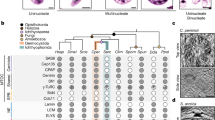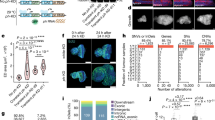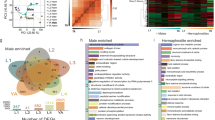Abstract
Each body segment of Drosophila follows a unique developmental pathway, controlled by the selective expression of homoeotic genes such as Sex combs reduced (Scr)1,2and the bithorax complex (BX-C)3,4. Little is known about the regulation of these genes, though several potential activators or repressers have been described5–8. For instance, absence of the extra sex combs (esc) gene product apparently causes adventitious expression of all the BX-C genes in most or all larval body segments5. Absence of the trithorax (trx) gene appears to prevent Scr and BX-C expression7,9,10 but only in adult cells; differentiation of the larval segments is only slightly affected11. I show here that the correct segmental differentiation of the larva does not require maternally deposited trx+ product, but that the esc mutant phenotype is suppressed by the removal of the trx gene, which implies that the BX-C can be differentially expressed in the absence of both the trx gene and the esc gene product.
This is a preview of subscription content, access via your institution
Access options
Subscribe to this journal
Receive 51 print issues and online access
$199.00 per year
only $3.90 per issue
Buy this article
- Purchase on Springer Link
- Instant access to full article PDF
Prices may be subject to local taxes which are calculated during checkout
Similar content being viewed by others
References
Lewis, R. A., Wakimoto, B. T., Denell, R. E. & Kaufman, T. C. Genetics 95, 383–397 (1980).
Struhl, G. Proc. natn. Acad. Sci. U.S.A. 79, 7380–7384 (1982).
Lewis, E. B. Nature 276, 565–570 (1978).
Lewis, E. B. in Developmental Biology using Purified Genes (eds Brown, D. D. & Fox, C. F.) 189–208 (Academic, New York, 1981).
Struhl, G. Nature 293, 36–41 (1981).
Capdevila, M. P. & Garcia-Bellido, A. Wilhelm Roux Arch. 190, 339–350 (1981).
Ingham, P. & Whittle, R. Molec. gen. Genet. 179, 607–614 (1980).
Duncan, I. M. Genetics 102, 49–70 (1982).
Ingham, P. W. D. thesis, Sussex Univ.(1980).
Ingham, P. W. Wilhelm Roux Arch. 190, 365–369 (1981).
Duncan, I. & Lewis, E. B. in Developmental Order: Its Origin and Regulation (eds Subtelny, S. & Green, P. B.) 533–554 (Liss, New York, 1982).
Tokunaga, C. & Stern, C. Devl Biol. 11, 50–81 (1965).
Struhl, G. & Brower, D. Cell 31, 285–292 (1982).
Kerridge, S. & Dura, J. M. Devl Genet. 3, 207–214 (1982).
Lindsley, D. L. & Grell, E. H. Carnegie Inst. Wash. Publ. 627 (1968).
Van der Meer,J. Drosoph. Inf. Serv. 52, 160 (1977).
Lohs-Schardin, M., Cremer, C. & Nusslein-Volhard, C. Devl Biol. 73, 239–255 (1979).
Author information
Authors and Affiliations
Rights and permissions
About this article
Cite this article
Ingham, P. Differential expression of bithorax complex genes in the absence of the extra sex combs and trithorax genes. Nature 306, 591–593 (1983). https://doi.org/10.1038/306591a0
Received:
Accepted:
Issue Date:
DOI: https://doi.org/10.1038/306591a0
This article is cited by
-
PCGF1-PRC1 links chromatin repression with DNA replication during hematopoietic cell lineage commitment
Nature Communications (2022)
-
COMPASS and SWI/SNF complexes in development and disease
Nature Reviews Genetics (2021)
-
The roles of Polycomb repressive complexes in mammalian development and cancer
Nature Reviews Molecular Cell Biology (2021)
-
Roles and regulation of histone methylation in animal development
Nature Reviews Molecular Cell Biology (2019)
-
Why are so many MLL lysine methyltransferases required for normal mammalian development?
Cellular and Molecular Life Sciences (2019)
Comments
By submitting a comment you agree to abide by our Terms and Community Guidelines. If you find something abusive or that does not comply with our terms or guidelines please flag it as inappropriate.



